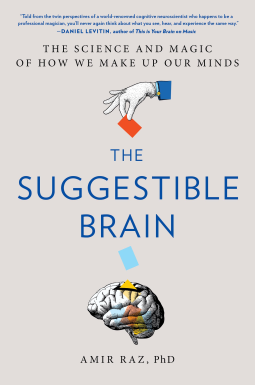Suggestibility can be defined as the tendency of an individual to accept or adopt the ideas or beliefs of others without critically examining or questioning their validity. Suggestibility is often presented in negative terms, implying others can unduly influence or deceive the individual. Amir Raz, the author of The Suggestible Brain, discusses suggestibility in depth, describing how extensive the trait appears in all humans, concluding everyone is suggestible.
Amir has unique qualifications for discussing suggestibility, having performed as a magician and a leading expert in the scientific study of suggestion. The book’s subtitle is The Science and Magic of How We Make up our Minds. Amir invites the reader to be aware of suggestibility’s profound influence on our daily lives. He engages the reader by telling many stories to illustrate his points. Amir describes at length both the advantages and disadvantages of suggestibility.
Amir proposes that suggestibility developed as an evolutionary advantage for humans. Suggestions permit us to learn quickly, bond with social groups, and explore other dimensions of human experience, including spirituality and belief.
The mind-body connection is an essential aspect of Amir’s discussions. Studies have shown that the mind can affect distinct components of the body. The placebo effect causes actual changes in the body when patients expect to get better. The application of placebos can bring up ethical concerns if it involves deception of the patient. Amir’s grasp of issues is amply shown in the case of antidepressants. Although antidepressants have shown to be essentially no better than placebos, they continue to be used due to the reluctance of the medical community to consider psychological interventions.
The public may be more attuned to the negative aspects of suggestibility. A person should always be aware of the uses of suggestibility in law enforcement, politics, and the media. Amir points out that even a person’s memory can be manipulated.
In summary, Amir proposes many benefits by learning the art and science of suggestibility, including empowering and protecting yourself, improving your immunity and physiology, and even changing your reality.
Amir proposes that suggestion is an essential part of life processes, including such experiences as faith, belief, and purpose.
This is a Member Review for NetGalley
